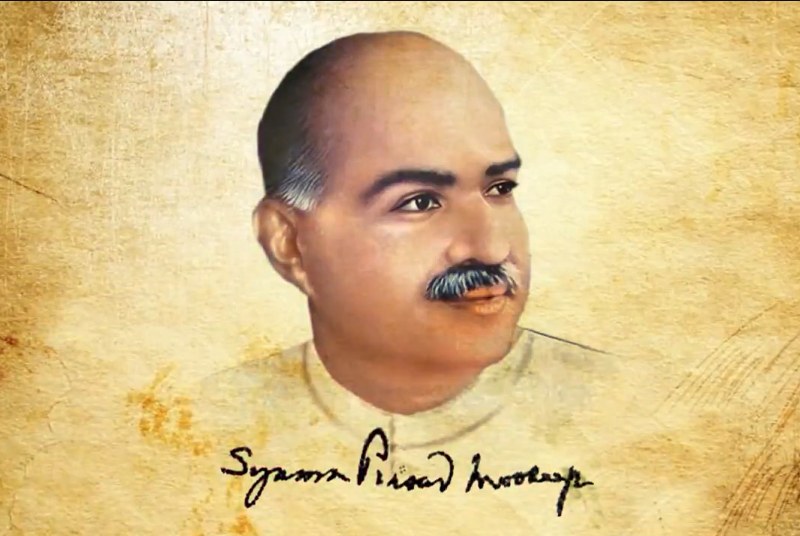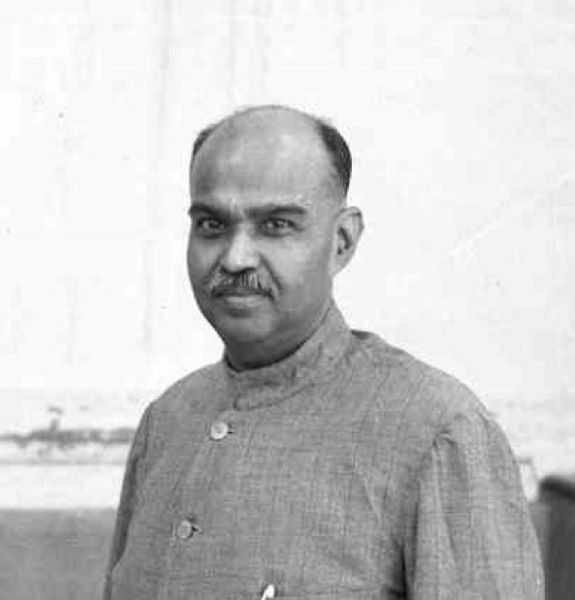
Dr. Syama Prasad Mookerjee, who prevented West Bengal's inclusion in Pakistan, honoured on his death anniversary
New Delhi: Prime Minister Narendra Modi on Sunday paid rich tributes on the death anniversary of Dr. Syama Prasad Mookerjee, who advocated and fought for the cause of "one nation, one leader, one law, and one emblem" and the integrity of India.
A firebrand politician, barrister, and an esteemed academic, Dr. Syama Prasad Mookerjee breathed his last on June 23, 1953, in Kashmir’s Srinagar where he was kept in custody in a cottage.
The Prime Minister said that Dr. Syama Prasad Mookerjee's glowing personality will continue to guide future generations.
The Prime Minister said in a X post, "Respectful tributes to the great son of the nation, renowned thinker, and academician Dr. Syama Prasad Mookherjee on his martyrdom day. He dedicated his life to the service of Mother India. His powerful personality will continue to inspire every generation of the country."
Tributes to Dr. Syama Prasad Mookerjee on his Jayanti. He is widely respected for his contribution to India’s development particularly in sectors such as commerce and industry. He was also known for his scholarly nature and intellectual prowess. pic.twitter.com/jcmgH3Lz6L
— Narendra Modi (@narendramodi) July 6, 2022
Dr. Syama Prasad Mookerjee was born on July 6, 1901. His father, Ashutosh Mookerjee, was a judge at the Calcutta High Court.
At the age of just 33, Dr. Mookerjee became the Vice-Chancellor of Calcutta University. During his tenure, Gurudev Rabindranath Tagore delivered a convocation speech at Calcutta University in Bengali.
Dr. Mookerjee became India's first Minister for Industry and Supply (now known as the Minister of Commerce and Industries) in Prime Minister Jawaharlal Nehru's cabinet.
Hindu rights and partition of Bengal
In 1937, under the Government of India Act of 1935, provincial elections were held, and no party secured a majority in Bengal.
The Congress emerged as the largest party, while the Muslim League and Krishak Praja Party also won substantial seats.
However, it was the Muslim League that managed to form the government in Bengal.

Dr. Syama Prasad Mookerjee (Image Courtesy: wikipedia.org)
Dr. Syama Prasad Mookerjee strongly opposed the policies of the Muslim League government at that time.
The government introduced the Calcutta Municipal Bill in the Bengal Assembly, which provided for separate electorates for Muslims. The bill was vehemently opposed by Dr. Mookerjee.
In 1941, the Muslim League government fell, and Dr. Syama Prasad Mookerjee formed a coalition government with Fazlul Haq in Bengal.
In this government, Dr. Mookerjee became the finance minister. At the time of independence, it seemed that the entire Bengal might become part of East Pakistan. Therefore, he demanded the partition of Bengal based on the majority Hindu population.
During this time, he remained firm in his movement for the rights of Hindus. Dr. Mookerjee believed that if the entire Bengal went to Pakistan, attacks on Hindus would increase in Muslim-majority areas.
He felt it was necessary to partition Bengal to retain the Hindu-majority western part in India. To garner support for this cause, Mookerjee undertook several tours and organized Hindu conferences in all regions of the state.
Following this, Bengal was partitioned, and due to his efforts, the entire Bengal did not become part of Pakistan. If this had not happened, West Bengal would have become a part of Bangladesh (then East Pakistan) today.
Kashmir issue and fight for "one nation, one leader, one law, and one emblem"
Following a disagreement with Nehru over the Liaquat–Nehru Pact, Mookherjee resigned from his cabinet position. In 1951, with support from the Rashtriya Swayamsevak Sangh, he established the Bharatiya Jana Sangh, which later evolved into the Bharatiya Janata Party.
After the country gained independence in 1947, and the Constitution was implemented in 1950. Following this, the then Congress government added Article 370 to the Constitution. At that time, Dr. Mookerjee was the Minister of Industry and Food in the government.
However, he strongly disagreed with the intentions of the government and resigned from his position.
As a votary of "one nation, one leader, one law, and one emblem", he launched a movement to remove Article 370 from Kashmir, citing it as a cause to protect the nation's honour and integrity. He demanded that the same laws and regulations to be applied in Kashmir as in other parts of the country.
Death
After his resignation, he was heading to Kashmir. When he entered Srinagar on May 11, 1953, Sheikh Abdullah's government arrested him.
Two of his associates were also arrested. At first, they were sent to Srinagar Central Jail, but later moved to a cottage outside the city.
He remained in custody for more than a month, and during this time, his health continued to deteriorate.
On June 22, 1953, Dr. Mookerjee experienced breathing distress and was shifted to a hospital, where he was found to have suffered a heart attack. The very next day, the Kashmir government announced that Dr. Mookerjee had passed away from a heart attack at 3:40 a.m. on June 23.
Support Our Journalism
We cannot do without you.. your contribution supports unbiased journalism
IBNS is not driven by any ism- not wokeism, not racism, not skewed secularism, not hyper right-wing or left liberal ideals, nor by any hardline religious beliefs or hyper nationalism. We want to serve you good old objective news, as they are. We do not judge or preach. We let people decide for themselves. We only try to present factual and well-sourced news.







